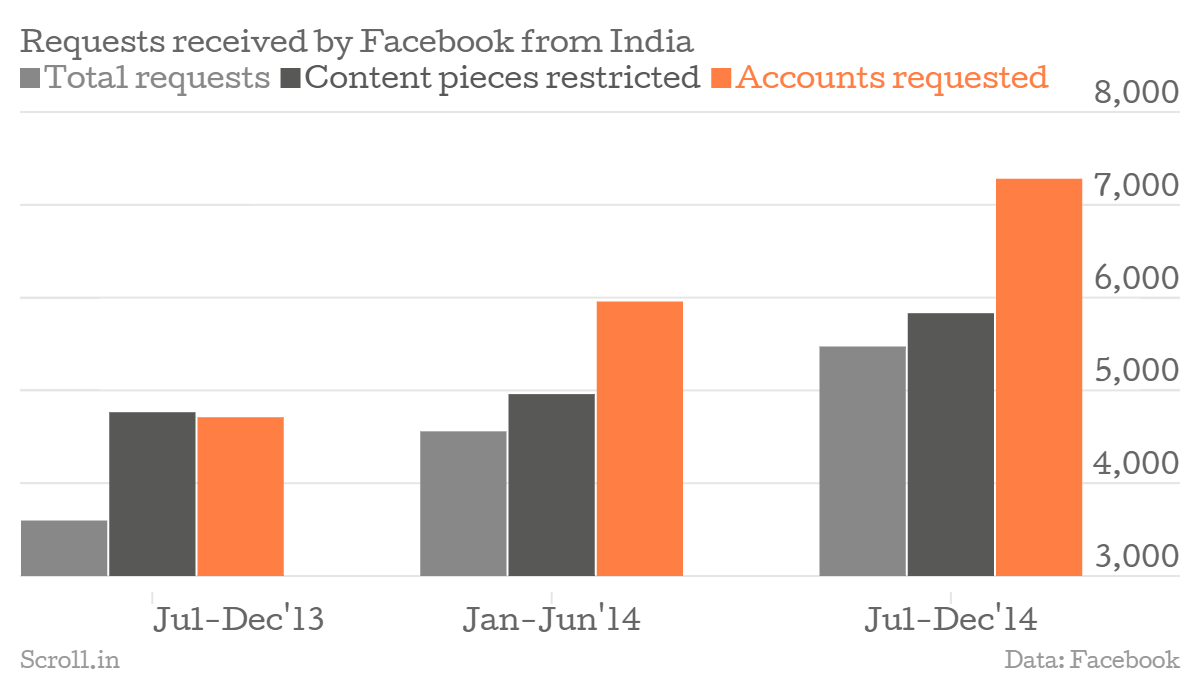Even though the Supreme Court in March scrapped the draconian Section 66A of the Information Technology Act that criminalised the transmission of offensive messages, social media in India isn't completely free.
In a transparency report released this week, the micro-blogging site Twitter noted that in the last six months, requests for information on user accounts from India have risen almost three times. These requests generally pertained to impending criminal investigations and user accounts that could “threaten public order”.
India filed 113 requests in the first six months of the year, up from 41 between July and December last year. Between January-June 2014, it made only 16 requests. (The US made the largest number of requests between January and July, 2014: 4,363, or 56% of all the inquiries received by Twitter.)
For its part, the Indian government sought information on close to 3,000 accounts in the first half of 2015. But Twitter complied with only 19% of the requests, as compared to 22% between July and December, 2014.
Requests from the government to remove content on Twitter more than doubled to 33 in the first six months of the year compared to 15 requests during the preceding period.
Twitter did not remove any of the content, though it had complied with 7% of the requests in the last half of 2014.
Other platforms
Earlier this year, a transparency report released by Facebook put India at the top of the list of countries that had requested information from the website. From July-December last year, Facebook blocked 5,832 pieces of content at the behest of the Indian government.
“We restricted access in India to content reported primarily by law enforcement agencies and the India Computer Emergency Response Team within the Ministry of Communications and Information Technology, including anti-religious content and hate speech that could cause unrest and disharmony,” the social networking platform said.
In the same period, India also made close to 5,500 requests for data to Facebook, which mostly pertained to criminal cases. These requests related to 7,281 Facebook accounts. The social network complied with 44.69% of the requests.
The search giant Google, in its transparency report, said that India had sent 535 requests for removal of content. Only nine requests for removal of items were made through court orders.
This chart shows the nature of requests made by India to Google for removal of content from January-June 2014. Out of these, defamation constitutes one-third of the requests while 5% related to religious material. Google complied with 8%-11% of these requests.
In a transparency report released this week, the micro-blogging site Twitter noted that in the last six months, requests for information on user accounts from India have risen almost three times. These requests generally pertained to impending criminal investigations and user accounts that could “threaten public order”.
India filed 113 requests in the first six months of the year, up from 41 between July and December last year. Between January-June 2014, it made only 16 requests. (The US made the largest number of requests between January and July, 2014: 4,363, or 56% of all the inquiries received by Twitter.)

For its part, the Indian government sought information on close to 3,000 accounts in the first half of 2015. But Twitter complied with only 19% of the requests, as compared to 22% between July and December, 2014.
Requests from the government to remove content on Twitter more than doubled to 33 in the first six months of the year compared to 15 requests during the preceding period.
Twitter did not remove any of the content, though it had complied with 7% of the requests in the last half of 2014.
Other platforms
Earlier this year, a transparency report released by Facebook put India at the top of the list of countries that had requested information from the website. From July-December last year, Facebook blocked 5,832 pieces of content at the behest of the Indian government.

“We restricted access in India to content reported primarily by law enforcement agencies and the India Computer Emergency Response Team within the Ministry of Communications and Information Technology, including anti-religious content and hate speech that could cause unrest and disharmony,” the social networking platform said.
In the same period, India also made close to 5,500 requests for data to Facebook, which mostly pertained to criminal cases. These requests related to 7,281 Facebook accounts. The social network complied with 44.69% of the requests.
The search giant Google, in its transparency report, said that India had sent 535 requests for removal of content. Only nine requests for removal of items were made through court orders.

This chart shows the nature of requests made by India to Google for removal of content from January-June 2014. Out of these, defamation constitutes one-third of the requests while 5% related to religious material. Google complied with 8%-11% of these requests.
Limited-time offer: Big stories, small price. Keep independent media alive. Become a Scroll member today!
Our journalism is for everyone. But you can get special privileges by buying an annual Scroll Membership. Sign up today!